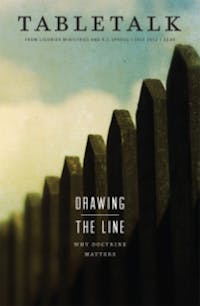
Request your free, three-month trial to Tabletalk magazine. You’ll receive the print issue monthly and gain immediate digital access to decades of archives. This trial is risk-free. No credit card required.
Try Tabletalk NowAlready receive Tabletalk magazine every month?
Verify your email address to gain unlimited access.
My first two books were on the subjects of dispensationalism and postmillennialism, respectively. I was thrilled, then, when asked to write my third book on the doctrine of sola Scriptura and a fourth book on the doctrine of the Lord’s Supper. You see, I didn’t want to become an “eschatology guy.” What in the world, you ask, is an “eschatology guy”? And why wouldn’t I want to be one? Is it some kind of super-villain?
In order to understand this fear I had, you have to understand a little bit about the dispensational circles I had recently left. I had become a Christian just out of high school, and the first church I attended was a small dispensationalist Baptist church. In that church, within the short space of two years, the pastor preached verse by verse through the book of Revelation. Twice. He encouraged me to read Edgar Whisenant’s 88 Reasons Why the Rapture Will be in 1988 as well as several Hal Lindsey books. I was under the impression that every significant event on the news was a sign that the rapture was imminent. My pastor was an “eschatology guy.”
When I enrolled at Dallas Theological Seminary, I was surrounded by “eschatology guys.” A few of the professors, such as John Walvoord and J. Dwight Pentecost, were world-renowned “eschatology guys.” Don’t get me wrong. Most of the students and professors I met at Dallas were and are godly men. But every discussion seemed to be about the rapture and second coming of Jesus. This was during the first Gulf War, and many of us wondered whether the world would last long enough for us to graduate.
I remained very interested in the biblical doctrine of the second coming of Christ even after transferring to a Reformed seminary, but I wanted to think through other issues as well. It was refreshing, then, in a strange sort of way, to go from a student commons area where the topic of debate was almost always related to the end of the world to one in which the topic of debate was apologetics, the law of God, or almost anything but the end of the world.
A strange thing happened, however, during those years. Some of my required classes at Reformed Theological Seminary required me to read books by men with names like Geerhardus Vos and Herman Ridderbos. I have to admit that the first time I read these works, I was able to grasp maybe ten percent of what I read. It was so conceptually different from anything I had heard before (not to mention the fact that Dutch theologians apparently have contests to see who can write the longest continuous paragraphs). But what I did understand sent me back to the Scriptures repeatedly. Over time, it began to dawn on me that I had a radically distorted understanding of eschatology.
I thought of “eschatology” as having to do solely with events connected with the end of the world—the rapture, the second advent, the general resurrection, the final judgment. And there is some truth to that. Traditionally, eschatology has been defined as the “doctrine of the last things” in relation to both the individual (death and the intermediate state) and to cosmic history (the return of Christ, the general resurrection, the final judgment, heaven, and hell).
Eschatology in a broader sense, however, concerns what Scripture teaches about God’s purposes in Christ for history. As such, eschatology does include a study of the consummation of God’s purposes at the end of history, but it also includes a study of the stages in the unfolding of those purposes. If the first coming of Christ, for example, inaugurated “the last days,” as the New Testament indicates, then eschatology must include Christ’s first advent as well as His second advent. It will also include God’s preparation throughout redemptive history for the first coming of Jesus Christ.
Considered from a biblical perspective, eschatology begins in the book of Genesis with the forward-looking plan of God to establish His kingdom and His presence on earth with the creatures created in His image to worship Him. It becomes especially clear after the fall, when God’s promise to crush the Serpent sets the stage for the cosmic conflict that ensues throughout redemptive history. Genesis 1–3 lays out the major themes found throughout the rest of Scripture, and these themes have a forward-looking, eschatological focus. These same themes find their resolution in the final chapters of Revelation. God will reestablish His presence and His kingdom with man in a new heaven and earth—a creation restored. Sin, death, and the Serpent, enemies introduced in Genesis, will be completely defeated.
The first Adam failed; the last Adam, Jesus Christ, succeeds. The last days began when His heel was bruised through His death on the cross and the Serpent’s head was crushed as Jesus walked out of the tomb. The last enemy, death, will be destroyed when we walk out of our tombs.
I do not worry about being an “eschatology guy” any longer because I’ve discovered that if I want to be a “biblical guy,” I have to be an “eschatology guy.” The two are one and the same.
